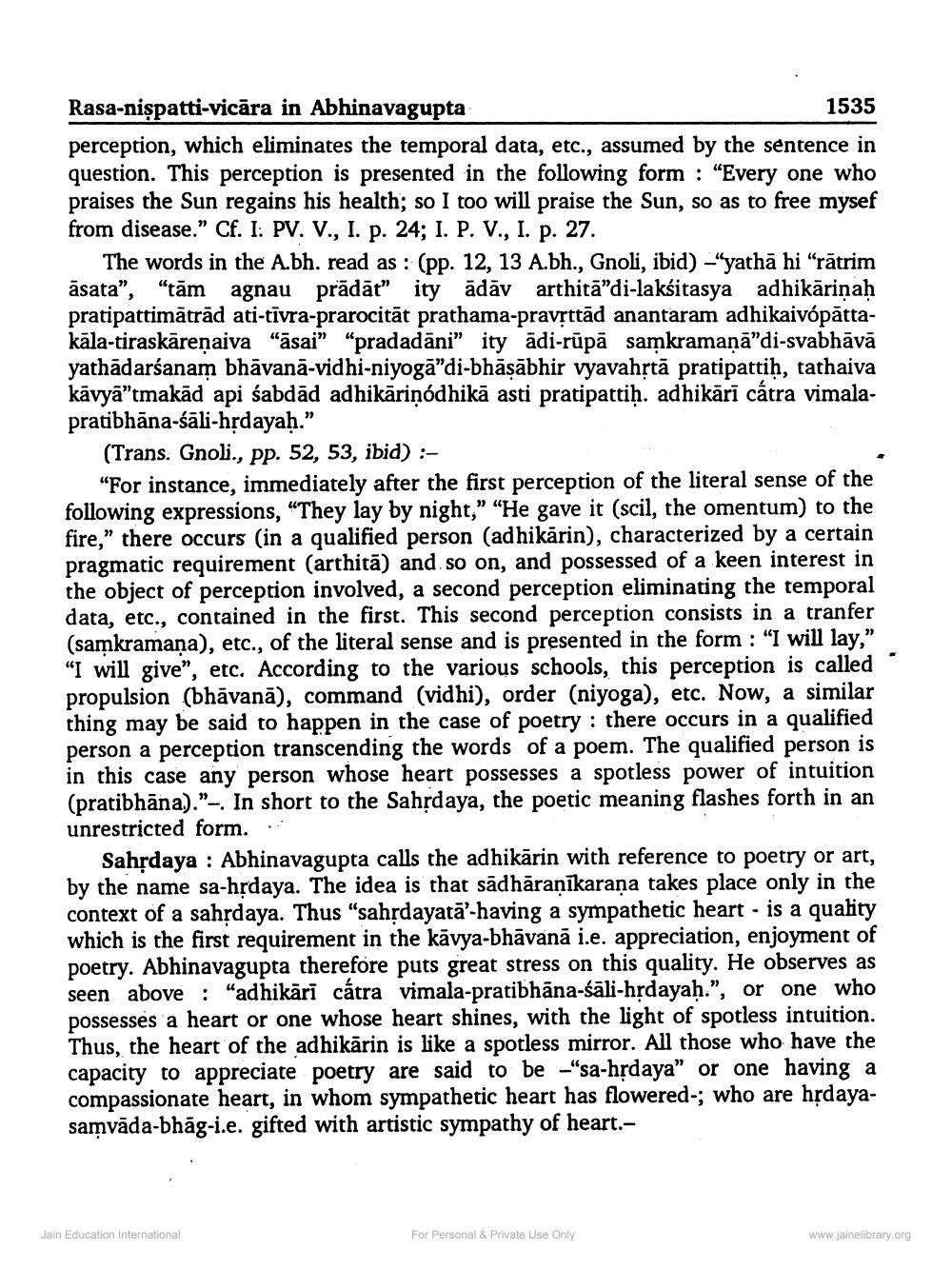________________
Rasa-nispatti-vicāra in Abhinavagupta
1535 perception, which eliminates the temporal data, etc., assumed by the sentence in question. This perception is presented in the following form : "Every one who praises the Sun regains his health; so I too will praise the Sun, so as to free mysef from disease." Cf. I. PV. V., I. p. 24; I. P. V., I. p. 27.
The words in the A.bh. read as : (pp. 12, 13 A.bh., Gnoli, ibid) -"yathā hi “rātrim āsata”, “tām agnau prādāt” ity ādāv arthitā”di-lakśitasya adhikāriņaḥ pratipattimātrād ati-tīvra-prarocitāt prathama-pravsttād anantaram adhikaivopāttakāla-tiraskārenaiva "āsai" "pradadāni" ity adi-rūpā samkramanā"di-svabhāvā yathādarśanam bhāvanā-vidhi-niyogā"di-bhāsābhir vyavahrtā pratipattih, tathaiva kāvyā”tmakād api śabdăd adhikāriņódhikā asti pratipattiḥ. adhikārī cátra vimalapratibhāna-śāli-hțdayaḥ.”
(Trans. Gnoli., pp. 52, 53, ibid) :
"For instance, immediately after the first perception of the literal sense of the following expressions, “They lay by night," "He gave it (scil, the omentum) to the fire,” there occurs (in a qualified person (adhikarin), characterized by a certain pragmatic requirement (arthitā) and so on, and possessed of a keen interest in the object of perception involved, a second perception eliminating the temporal data, etc., contained in the first. This second perception consists in a tranfer (samkramana), etc., of the literal sense and is presented in the form : "I will lay,” "I will give", etc. According to the various schools, this perception is called propulsion (bhāvanā), command (vidhi), order (niyoga), etc. Now, a similar thing may be said to happen in the case of poetry : there occurs in a qualified person a perception transcending the words of a poem. The qualified person is in this case any person whose heart possesses a spotless power of intuition (pratibhāna)."-. In short to the Sahrdaya, the poetic meaning flashes forth in an unrestricted form..
Sahrdaya : Abhinavagupta calls the adhikarin with reference to poetry or art, by the name sa-hrdaya. The idea is that sādhāranīkarana takes place only in the context of a sahrdaya. Thus "sahşdayatā’-having a sympathetic heart - is a quality which is the first requirement in the kävya-bhāvanā i.e. appreciation, enjoyment of poetry. Abhinavagupta therefore puts great stress on this quality. He observes as seen above : "adhikari cátra vimala-pratibhāna-śāli-hrdayah.", or one who possesses a heart or one whose heart shines, with the light of spotless intuition. Thus, the heart of the adhikarin is like a spotless mirror. All those who have the capacity to appreciate poetry are said to be -“sa-hrdaya" or one having a compassionate heart, in whom sympathetic heart has flowered-; who are hrdayasamvāda-bhāg-i.e. gifted with artistic sympathy of heart.
Jain Education International
For Personal & Private Use Only
www.jainelibrary.org




